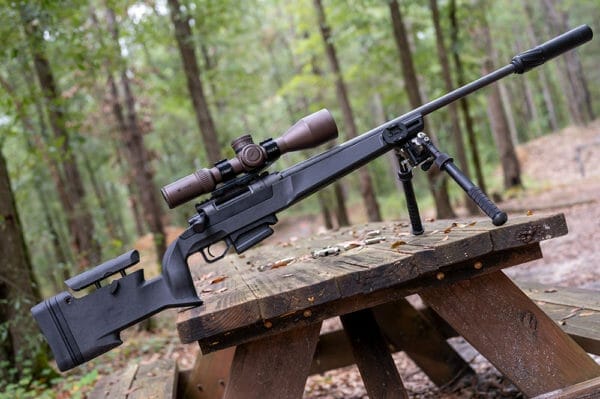
U.S.A. –-(AmmoLand.com)- In Maine, the Governor signed suppressor, (gun muffler, silencer) reform into law. The change in law took effect on 8 June, 2021. It is now part of Chapter 112, Public Law.
When the Maine legislature reformed Maine’s ban on hunting with suppressors, the law required a hunter to obtain a special permit to hunt with suppressors. It was an added bureaucratic burden which did not good. It increased useless paperwork and wasted everyone involved’s time.
Here is how the old law read. From mainlegislature.org:
2. Permit. In accordance with this subsection, the commissioner may issue a permit to a person allowing that person to use a noise suppression device with a firearm when hunting any wild animals or wild birds the person is licensed to hunt under this chapter and for which use of the firearm is allowed or for the purpose of killing a wild animal or wild turkey under section 12401 or 12402.A. A person applying for a permit:
(1) Shall show proof of lawful possession of the noise suppression device; and(2) May not have had a hunting license revoked as a result of a serious hunting violation. [PL 2015, c. 262, §1 (NEW).]B. A permit is valid unless revoked under this section. [PL 2017, c. 366, §1 (AMD).]
S.P. 249 – L.D. 635 An Act Relating to Hunting with a Noise Suppression Device
Be it enacted by the People of the State of Maine as follows:Sec. 1. 12 MRSA §10902, sub-§6-A is enacted to read:6-A. Mandatory hunting license revocation when using a suppressor. The commissioner shall suspend a person’s hunting license for at least 3 years if that person is convicted of any violation listed in subsection 6 and found to have been in possession, at the time of the offense, of a firearm with a device used to suppress or deaden the sound or natural report of the firearm.Sec. 2. 12 MRSA §11161, as amended by PL 2017, c. 366, §1, is repealed.Sec. 3. 12 MRSA §11214, sub-§1, ¶C, as amended by PL 2015, c. 262, §2, is repealed.
The reform of removing the requirement of a special permit to hunt with a suppressor in Maine is a classic example of incrementalism.
The next reform might be to remove the requirement for a Federal Suppressor Tax Stamp, as was recently done in Texas. The Federal NFA tax stamp requirements make far less sense than did the Maine permit for using a suppressor while hunting.
Suppressors, gun mufflers, silencers are part of the weak underbelly of the National Firearms Act. Regulation of them never made any sense. They were just part of the Franklin Delano Roosevelt (FDR) administration’s power grab to place firearms under federal jurisdiction.
It seems, even in the FDR administration, it was only Homer Cummings, the progressive Attorney General ideologue, who pushed hard for federal gun control. When he was gone, the push for gun control stopped for over 20 years.
About Dean Weingarten:
Dean Weingarten has been a peace officer, a military officer, was on the University of Wisconsin Pistol Team for four years, and was first certified to teach firearms safety in 1973. He taught the Arizona concealed carry course for fifteen years until the goal of Constitutional Carry was attained. He has degrees in meteorology and mining engineering, and retired from the Department of Defense after a 30 year career in Army Research, Development, Testing, and Evaluation.








It’s meaningless:
https://parkercountyblog.com/2021/06/18/texas-suppressor-freedom-act-signed-by-the-governor/
If a Texan buys a suppressor in Texas that was made in Texas and then goes on Facebook and brags about it, the BATFE will persecute and prosecute the Texan who purchased the suppressor and the Texan who sold the suppressor.
Ken Paxton will be silent.
“The next reform might be to remove the requirement for a Federal Suppressor Tax Stamp, as was recently done in Texas.”
Can someone elaborate on that for me? The way it’s worded sounds as if, in Texas, a federal tax stamp is not required… even though it is under federal law. Similar to the way California, and a few other states, decriminalized marijuana even though it was still against federal law.